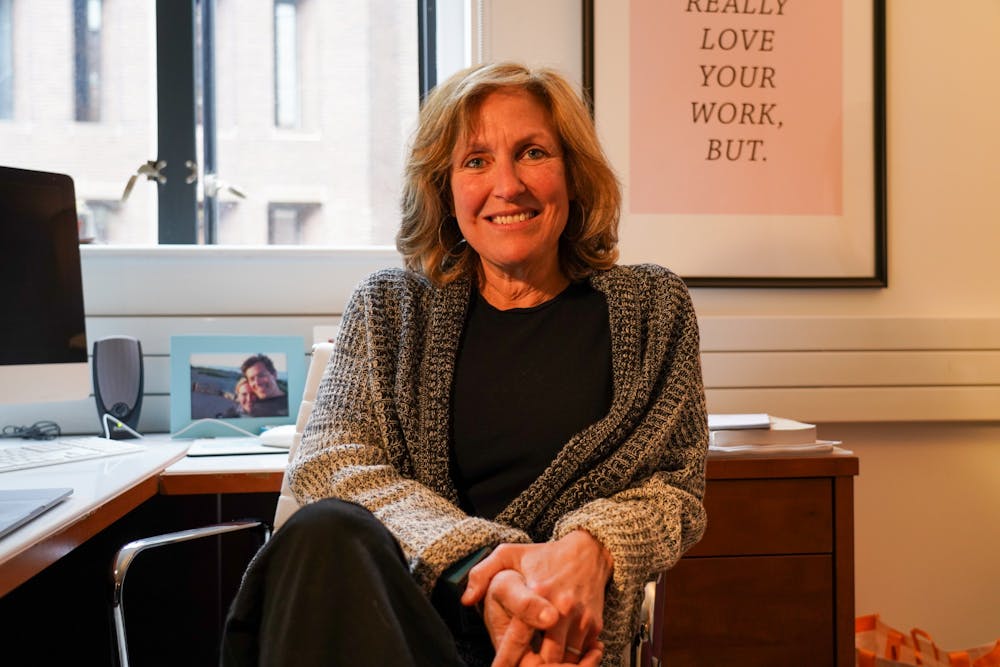When Professor Kathy DeMarco Van Cleve (C ’88, W ’89) attended Penn, she focused on rowing, boys, and her English classes—in that order.
In an office fit for an IKEA commercial, Van Cleve sits comfortably in a plush chair across from me. She’s just finished directing the photographer through her portrait, asking them to “Photoshop her wrinkles out” while clearing off her semi–cluttered desk. “This is how I clean my house: by throwing everything in a drawer,” she says with a grin. She talks about her two now–teenage sons, photos of their supposedly cuter days on display. There’s a poster on the wall simply bearing the words “WE REALLY LOVE YOUR WORK, BUT.” She points it out and tells me that it's a phrase you can’t escape in her industry.
When she was a junior at Penn, she was offered the opportunity to sub–matriculate and get a Master’s degree in English or pursue a second bachelor’s from Wharton. Following the directive of her father, Van Cleve stayed on for a fifth year to complete the credits required for her Wharton degree. In order to convince her parents to let her live on campus instead of at home in South Jersey, Van Cleve needed a job, so she interviewed for a Philadelphia company that hired one Penn athlete every year. She landed the position and spent that school year in accounting and statistics classes all morning, at work until 8 p.m., and training for the New York Marathon during her few and far between free moments.
Her hard work paid off. In 2022, Van Cleve is an accomplished novelist, screenwriter, and film producer. However, the job that she interviewed for in 1988 was at International Raw Materials, a chemical fertilizer trading company. “It didn’t even occur to me to try to find a path that included writing. I remember actually thinking ‘Well, I guess I’m meant to be an international chemical fertilizer trader,” Van Cleve says.
She paints a vivid picture of when she realized that she couldn’t possibly continue at IRM. “I was in the elevator with a colleague, and he pressed seven. We got out together and I remember thinking, I can’t be like him," she says. "For the record, he’s still there today.” With some encouragement from her late mother, Van Cleve quit to pursue a career in writing.
At the age of 31, Van Cleve published her first book, Cranberry Queen. After her then long–term boyfriend left a Knicks game with another woman, Van Cleve coped with her heartbreak by writing a book about a young woman undergoing an identical experience. Van Cleve says that modeling the main character after herself allowed her to process the “brutal” breakup through a third party. There’s one major difference between Kathy and her character, though: Cranberry Queen’s action starts when the main character’s entire family is killed in a car accident. “My friends said that Kathy needed to [fictitiously] kill off her entire family to get over her heartbreak,” she says. She was betrayed by someone she cared deeply about, and so she directed her anger toward a fictional rendition of the people she cared most about: her “big, warm, Italian family.” When I ask Van Cleve about the proudest moment of her life, she tells me it was the phone call she got telling her that Cranberry Queen had been sold.
After a successful bout in Hollywood, Van Cleve returned to Penn to teach English. She draws on the teaching style of her most beloved professor, Al Filreis. In his classes, Van Cleve “felt like he read everything [she] wrote,” a feeling she now strives to give her own students. It works: Van Cleve pulls up an email from a student who graduated years ago, updating her on his own achievements and how the lessons from her screenwriting classes help him in economics presentations at the University of Chicago.
Her feet on the coffee table, Van Cleve stories her life with cracking wit and confident self–awareness. She admits her own sensitivity and tells me about the sharp pain of reading a negative book review. Her most recent book is a Young Readers’ adaptation of Erica Armstrong Dunbar’s Never Caught: The Washingtons’ Relentless Pursuit of Their Runaway Slave, Ona Judge. The book won the Children’s History Book Prize and tells the story of Ona Judge, a slave who ran away from George and Martha Washington. The story is dear to Van Cleve’s heart and represents a moral evaluation. “If you don’t like the story of Ona Judge, you’re a bad person,” she says with an earnest smile.
The wall of Van Cleve’s desk bears a pushpin board full of photos of her family. Her husband and her sons who “are the cause of all these wrinkles” smile from the wall. Van Cleve, despite being a terrible cook, loves family dinners, board games, and watching her sons do anything outside. She spends her time between classes doing crosswords and Wordle, stressing about her older son’s college process, and finding new books to read.
Van Cleve is a writer, a mother, a professor. Throughout the interview—and her life—she applies a wicked sense of humor and a sensitive delicacy, rendering both her writing and her classes accessible. With a ready smile and a sense of style that belies her age, Van Cleve unapologetically brings her whole self to everything she does.







